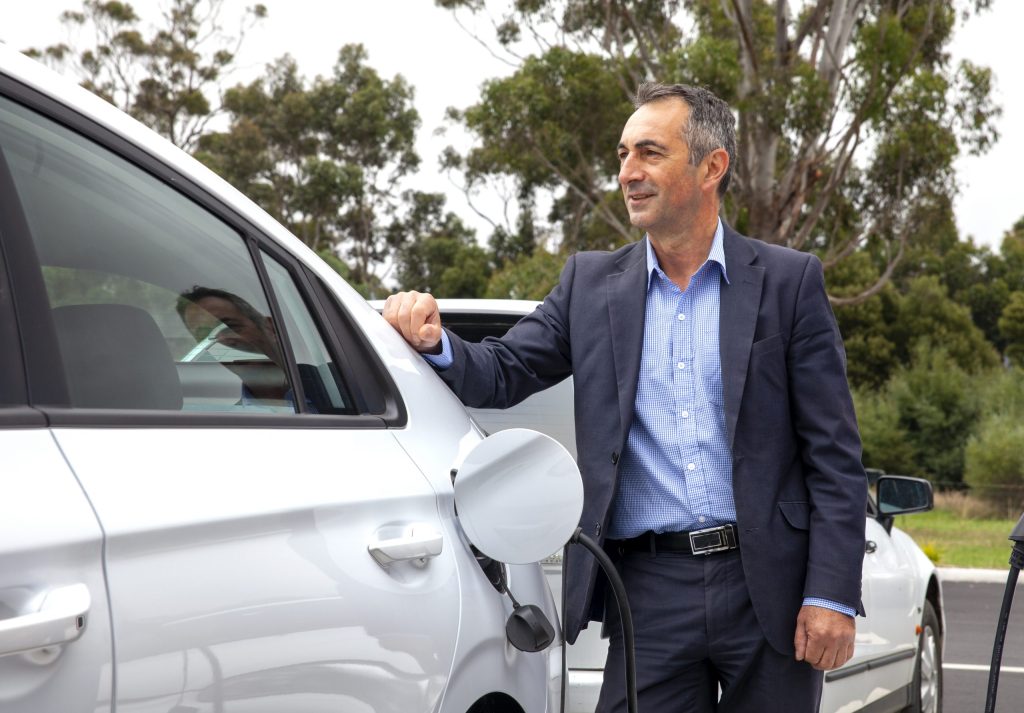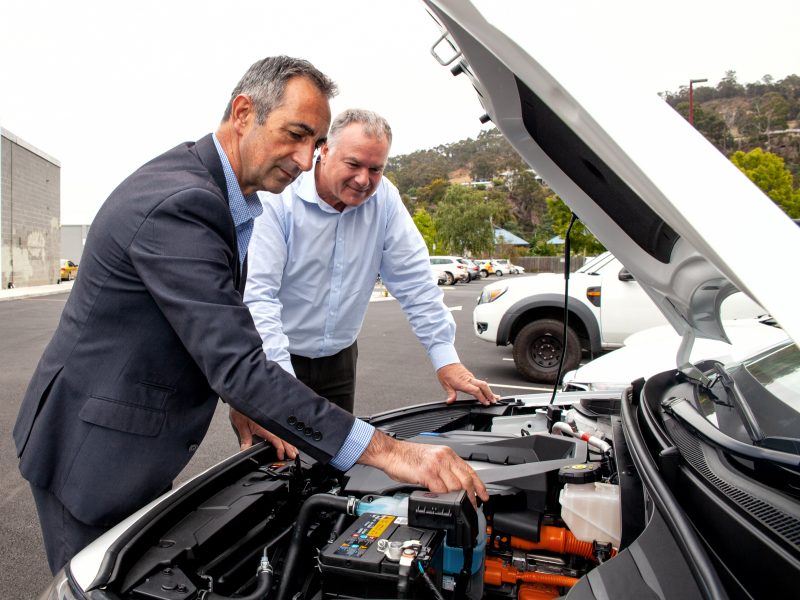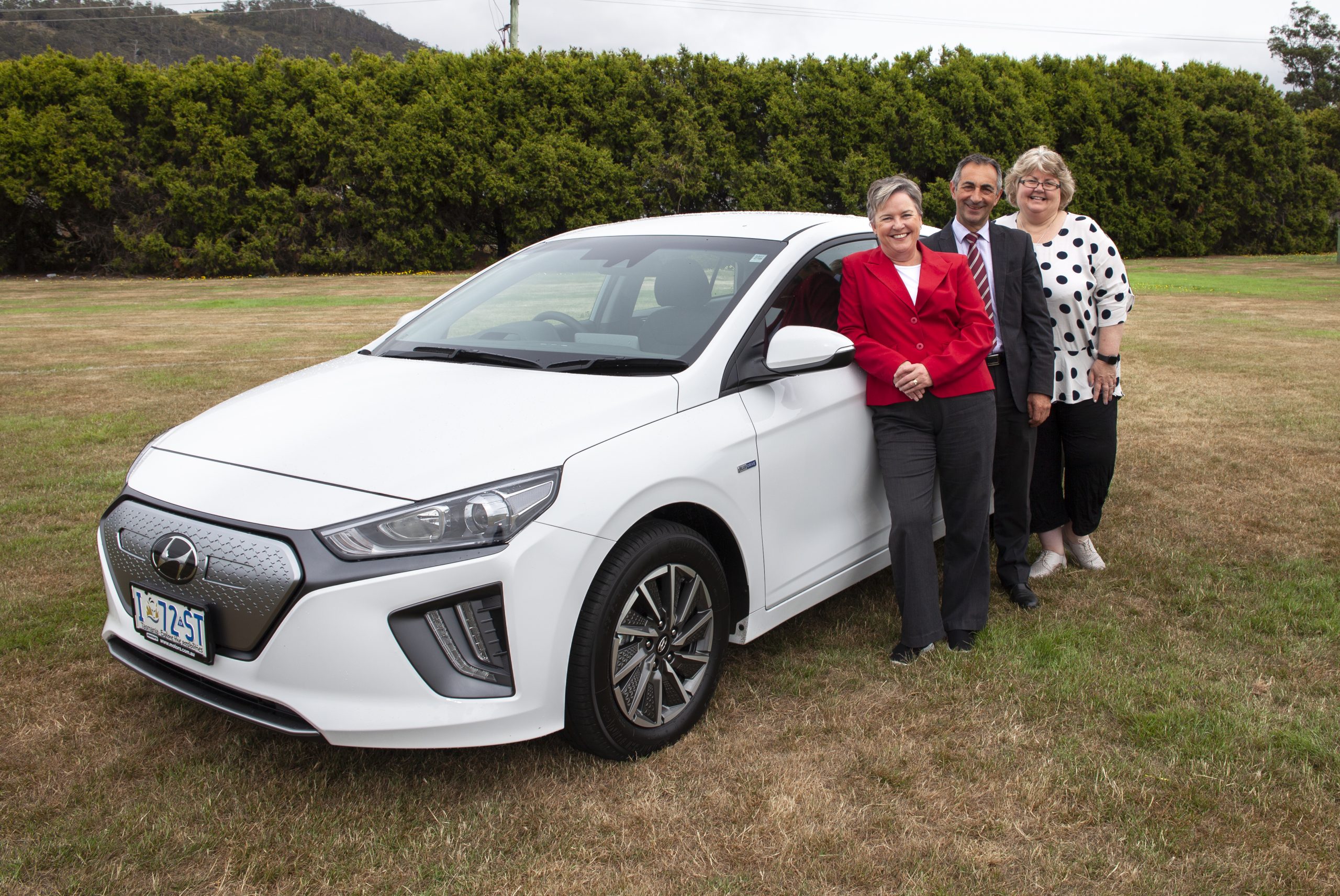
The Huon Valley Council is excited to announce the arrival of the Hyundai Ioniq, its first electric vehicle (EV) officially unveiled today.
“Our car selection was based on a recommendation made in the Smarter Fleets report, price, warranty, ease of charging in a 10-amp power outlet, and kilometre range,” said Huon Valley Council General Manager Emilio Reale. The Smarter Fleets report is the work of the Sustainable Living Tasmania and the Tasmanian Climate Change Office.
Mr Reale stated, “the Ioniq is the most economically priced EV available at this time, and with a good range of 311km, it meets our needs well as a fleet vehicle.

“As part of the assessment process, the car was test-driven to make sure it would be user-friendly for staff.
“The 2020 model will comfortably make three return trips to Hobart without needing a top-up charge.”
Mr Reale said that the new addition will play an important role in building staff awareness about the use and benefits of EVs.
“It marks the start of our organisation’s move away from combustion engine vehicles. This transition is part of Council’s leadership role on climate change through the reduction of greenhouse gasses produced as part of operating a fleet.”
Transportation makes up 30 per cent of greenhouse gas emissions in the Huon Valley, according to the Huon Valley Council Community Energy Use and Greenhouse Gas Footprint Summary Report, May 2019.
Supporting the uptake of EVs was one of the five Cities Power Partnership pledges Council made to make the switch to renewable and more efficient sources of energy.
Huon Valley Council Mayor Bec Enders said she is proud that Council is embracing new technologies and leading by example in the shift towards renewable energy sources.
“As costs continue to drop and travel range rises, there will be more opportunities for EVs to join our fleet in the years to come. Future purchases will be determined by directions in our Huon Valley Climate Change Strategy and operational needs.”
“This transition is part of Council’s leadership role on climate change through the reduction of greenhouse gasses produced as part of operating a fleet.”
In addition to reducing air pollution, other benefits to EVs include lower running and maintenance costs.
“Sustainable Living Tasmania has predicted that within five years, electric vehicle costs and performance will make them the more practical and cost-effective choice over internal combustion-engine (ICE) vehicles in most cases,” said Cr Enders.
In the Huon Valley, there is currently a charging station located in the Main Street Car Park, Huonville, with installation of a fast charger in Geeveston now underway. Cr Enders says Council hopes to install more EV chargers throughout the Huon Valley, in locations such as Cygnet, Dover, and Southport, as more grant funding opportunities become available.
 Huon Valley Council Mayor Bec Enders with General Manager Emilio Reale and Deputy Mayor Sally Doyle
Huon Valley Council Mayor Bec Enders with General Manager Emilio Reale and Deputy Mayor Sally Doyle
“The next potential locations for EV chargers would be selected based on where they would provide the most benefit,” said Cr Enders. “It may not be practical to transition to EV use in a number of areas until travel range increases and charge time reduces so the cars are suitable for operational and industry purposes.
“We are committed to facilitating the uptake of EVs in the Huon Valley, and will make way for more private operators to start selling the use of charging stations. This will ensure we are not competing with local businesses and running into competitive neutrality issues.”
Community members who are interested to find out more about EVs can come along to the launch of an Electric Vehicle Community Bulk Buy of quality second-hand EVs taking place tonight, 7:30pm at the Huonville Town Hall, 40 Main Street, Huonville. The bulk purchase was made through a collaboration between Circular Economy Huon and the Good Car Company to drive down the price of purchasing an EV for Huon Valley residents. Bookings are a must on the Good Car Company website.
“By making EVs a more cost-effective option, initiatives such as Circular Economy Huon’s bulk buy will be strong drivers for the uptake of EVs and other non-ICE vehicles within our community,” said Cr Enders.
Funds for the EV were included in Council’s 2019/20 budget to replace the organisation’s existing petrol-powered pool car which was due for replacement. Further detail on the vehicle is available on the Hyundai website.
For tips on lowering your greenhouse gas emissions and investing in climate action, download the Climate Action Toolkit on the Climate Council website.
Download a print-friendly version of this release here.

